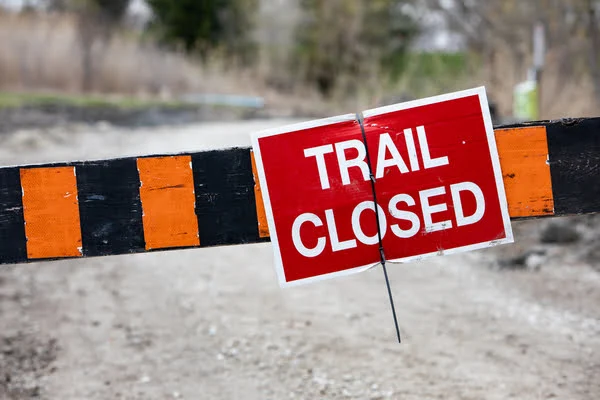Perhaps you’ve been here before. You drive up to a nearby State Park or National Forest and see a gate blocking the entrance with a sign reading “CLOSED”?
If you’re like me, that might lead you to think, can public land be closed?
Find out what it means for public land to be closed, who can close it, and the penalties for violating closures.
Table of Contents
- Can Public Land Be Closed?
- Penalties For Recreating on Closed Public Land
- Why Can Public Land Be Closed?
- Final Thoughts
- Related Posts
Can Public Land Be Closed?
Public land can be closed to public access for a variety of reasons. Parks can be partially or fully closed or only closed to specified activities. Usually, when an area closes, employees will post notices to notify the public.

What is Public Land?
Public land is an area of land or water collectively owned by US citizens and managed by public agencies.
So, if public land is owned by the people, how can it be closed and who has the power to close it?
Who Has the Power to Close Public Land?
Public land closures are usually established by the area’s land manager.
US and state legislature include stipulations allowing land managers to close public areas at their discretion for various reasons.
The most prominent land managers of public land are:
- National Parks Service (NPS)
- US Forestry Service (USFS)
- Department of Interior-Bureau of Land Management (BLM)
- US Fish & Wildlife Service (USFWS)
- State Departments of Natural Resources or similar (DNR)
- Local agencies or municipalities
If you suspect an area might be closed, or to check ahead of time, you can often look up the land manager’s website for closure notices or use restrictions.
What Does it Mean for Public Land to Be ‘Closed’?
Of course, when the USFS closes a recreational area, they aren’t installing fencing around the perimeter or patrolling every inch of the park.
When an agency closes a national park or BLM land, this usually looks like gates and signage being placed on major access points to the park.
Part of the wording of the policies that allow land managers to close an area also requires land managers to make a reasonable effort to inform the public of the closure.
When a land manager closes a public park or a part of an area, they are effectively announcing that access to that area can be deemed a misdemeanor offense or that engaging in prohibited activity can be punished.
You might be able to get away with bushwhacking into a closed state park, but it’s usually in your best interest to obey restrictions, if for no other reason than to protect yourself from having to pay a hefty fine.
Closed parks get patrolled by park rangers, local law enforcement, and game wardens who have the authority to punish you per relevant federal or state regulations.
Penalties For Recreating on Closed Public Land
Exact penalties for violating public land closures will depend on the location and details of the violation.
Penalties that we found were commonly fines of up to $5,000 or up to 12 months in prison if caught violating a closure.
Similar fines are in place for violating recreation restrictions like camping in a non-designated area or violating a fire restriction.
Why Can Public Land Be Closed?
There are many reasons why a land manager might want to close a public use area.
Due to recent events, the first things that might come to mind are the closures for the COVID-19 pandemic or government shutdown, but these cases are exceptions to the norm.
In most cases, public land closes to protect the health and safety of users or the wildlife and ecosystems within the park. That’s why public land closures should be taken seriously, to protect your safety and the natural spaces we enjoy recreating in.
Here is a list of the most common reasons for public land closures:
- Maintenance
- Fire risk
- Environmental protection
- Concerns for public health and safety
- Protection of natural or cultural resources
- Protection of scenic values
- To aid scientific research
- Special events
- To avoid conflict among visitor activities
- Staff shortage–such as during a government shutdown
- Misuse of the land by visitors
Final Thoughts
Hopefully, this article has helped you understand why public land can be closed. Usually, land closures intend to protect you or the ecosystem within the park.
If the area you were hoping to camp or hunt in is closed, it’s probably best to just go elsewhere rather than risk a fine or getting caught in a forest fire.
Thanks for being a good steward, and thanks for reading.





